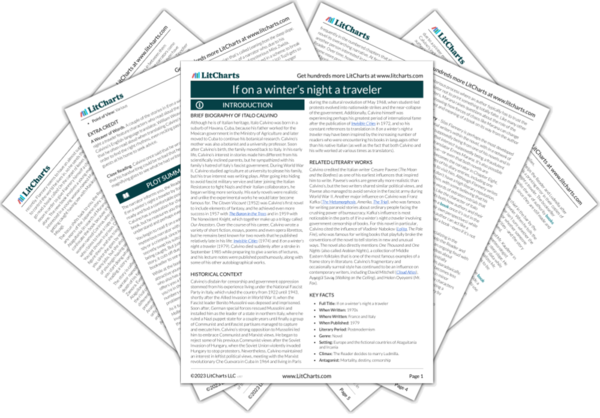Much of If on a winter’s night a traveler takes place in locations frequently associated with books, like a bookstore, a university, and a publishing house. The novel explores not just books themselves but also the culture surrounding them, which both academia and the publishing industry greatly influence. While an experimental novel like If on a winter’s night a traveler might seem like a natural fit for an academic setting, in fact the book is fairly critical of universities and literary theory. Unlike the Reader and the Other Reader, who read mostly out of personal interest and to be surprised or entertained, the student Lotaria only reads books to confirm the truth about something she’s already looking for. The seminar she’s part of at the university only reads a small fragment of the book before discussing it in abstract terms for the rest of the month. Similarly, Professor Uzzi-Tuzii gets so bogged down in the explaining the details of the Cimmerian language that it eventually becomes impossible to follow his story. These attitudes toward literature demonstrate the limits of reading from a strictly academic perspective.
Similarly, the book’s portrayal of the publishing industry also calls into question traditional ideas about the importance of novels. As the Reader learns from his experience buying books with printing errors from the bookseller, it’s easy for a publishing mistake to totally change the author’s intention. Furthermore, the publishing house that the Reader visits seems to be in a constant state of chaos. Amid this chaos, the publisher ends up publishing counterfeit translations by Ermes Marana that don’t even resemble the original books. And in the process of doing so, the publisher gives these fakes an air of legitimacy. And so, just as Calvino draws attention the interior workings of a novel, he also explores the external aspects of a novel’s creation and how the people involved in publishing and bookselling are fallible humans who can influence the process. While Calvino’s harsh criticisms of academia and the publishing industry may be partly affectionate, they ultimately encourage his audience to be skeptical of traditional sources of wisdom and instead attempt to approach books without any preconceived ideas.
Academia and Publishing ThemeTracker

Academia and Publishing Quotes in If on a winter’s night a traveler
And so the Other Reader makes her happy entrance into your field of vision, Reader, or, rather, into the field of your attention; or, rather, you have entered a magnetic field from whose attraction you cannot escape. Don’t waste time, then, you have a good excuse to strike up a conversation, a common ground, just think a moment, you can show off your vast and various reading, go ahead, what are you waiting for?
Mr. Kauderer shook his head but didn’t look her in the face. “He isn’t a Kauderer! We’re the ones who are in danger, always!”
“Me? I don’t read books!” Irnerio says.
“What do you read, then?”
“Nothing. I’ve become so accustomed to not reading that I don’t even read what appears before my eyes. It’s not easy: they teach us to read as children, and for the rest of our lives we remain the slaves of all the written stuff they fling in front of us. I may have had to make some effort myself, at first, to learn not to read, but now it comes quite naturally to me. The secret is not refusing to look at the written words. On the contrary, you must look at them, intensely, until they disappear.”
The Cimbro-Cimmerian debate does not seem to affect Ludmilla, now occupied with a single thought: the possibility that the interrupted novel might continue.
You realize at once that Mr. Cavedagna is that person indispensable to every firm’s staff, on whose shoulders his colleagues tend instinctively to unload all the most complex and tricky jobs.
Ermes Marana appears to you as a serpent who injects his malice into the paradise of reading.
This quote describes the Reader’s reaction to first hearing about Ermes Marana, a translator whom the Reader learns about in the publishing house he visits and who seems to have an unusual life full of conspiracy and mystery. Marana has a reputation as a counterfeiter, claiming to translate books but in fact replacing them with translations of totally unrelated books. While the Reader seems to be interested in Marana, unable to stop reading his letters, ultimately the Reader finds Marana disturbing.
By raising the idea that a translation could be an unfaithful copy of the original, Marana destroys the Reader’s notion of a book as an act of communication between an author and a reader. Although Marana represents an extreme case, he illustrates how in general, translation can be a tricky job, and even a faithful translator may nevertheless introduce some changes into a book. By refusing to remain ignorant about the book-making process, the Reader, like Ludmilla, finds himself falling down a rabbit hole of questions that make him doubt everything he knows about reading. This reinforces the novel’s broader argument about how the truth can be elusive and fragmented.
It was a mistake to invite her: this was during my first days of teaching, they did not yet know the sort I am here, she could misunderstand my intentions, that misunderstanding in fact took place, an unpleasant misunderstanding, even now very hard to clarify because she has that ironic way of looking at me, and I am unable to address a word to her without stammering, the other girls also look at me with an ironic smile.
I have had the idea of writing a novel composed only of beginnings of novels. The protagonist could be a Reader who is continually interrupted. The Reader buys the new novel A by the author Z. But it is a defective copy, he can’t go beyond the beginning.











